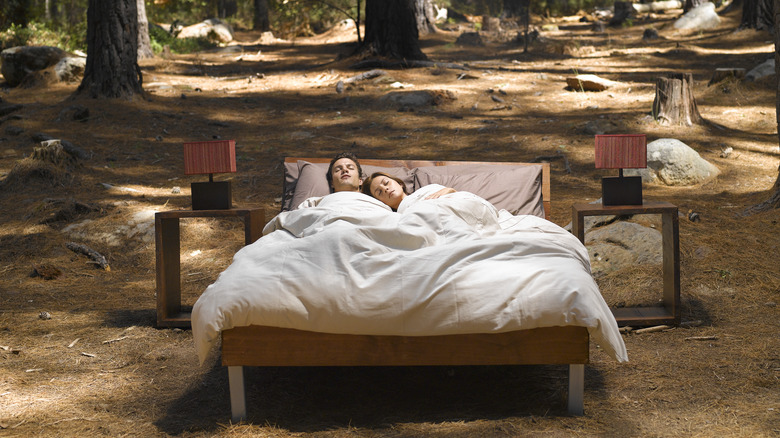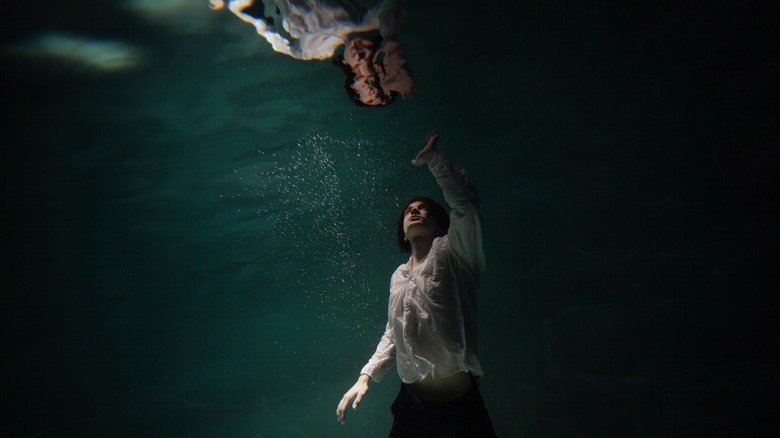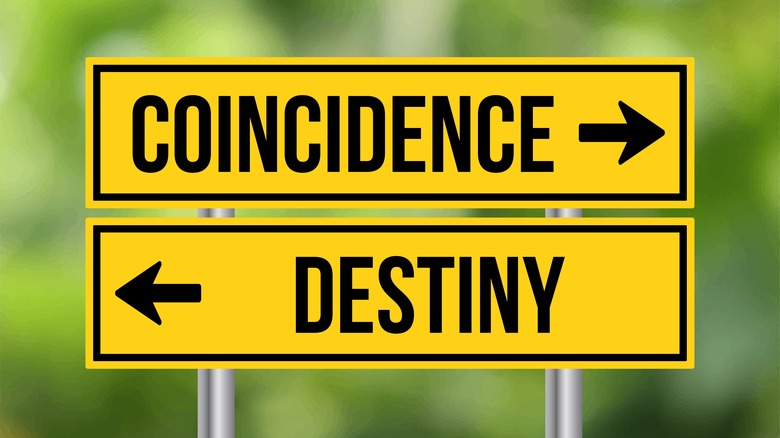Can Precognitive Dreams Really Tell The Future?
On the night of March 14, 44 B.C., Calpurnia, the wife of the Roman Emperor Julius Caesar, had a terrifying dream. Some sources claim that she dreamt of the collapse of Caesar's house, while others record that she was awoken by the image of her husband dying in her arms. Whatever the dream was, it so shook Calpurnia that she begged Caesar not to go to the Senate the following day. However, he ignored her. Caesar met with a group of his former allies, who stabbed him to death.
The episode is one of the most famous examples of a precognitive dream in antiquity, but the experience of having dreams that seem to predict the future isn't just the reserve of historical figures or works of fiction. In fact, in her study "Precognitive Dreaming: Investigating Anomalous Cognition and Psychological Factors," published in the Journal of Parapsychology, Caroline Watt notes that 67% of 1,500 Americans in a survey had previously recorded psychic experiences, while another study on 1,000 subjects in the U.K. found that about 33% had experienced precognition. A third study found that 60% of apparent precognition had come in the form of a dream.
Being given an important message about the future either in the form of a symbolic dream, a clear image of an event that has not yet come to pass, or a message from beyond the grave concerning future events, would all typically be considered supernatural or paranormal occurrences that physical laws cannot explain. However, rather than write the phenomenon off, some experts have put forward explanations as to why so many of us seem to see the future in our dreams.
The non-linear time theory
Most modern societies are taught to think about time in a linear manner: one event leads on to the next, each moment passes, and the past is lost forever. However, this has not always been the case. Many ancient cultures saw time as cyclical, akin to the cycle of nature through the seasons.
And over the last century, physics has made such advances in the wake of Albert Einstein's theory of relativity that causality itself has been refuted as the governing order underpinning the universe. Some physicists now claim that the feeling that time flows or is somehow passing is actually an illusion and that it constitutes the fourth dimension of the universe that humans experience in three dimensions.
Some take these developments in physics as evidence that non-linear experiences of time are therefore possible, and that, perhaps, when we experience precognitive dreams we are indeed peering into the future through some altered experience of time itself. However, thus far there is no definitive proof that the anecdotal experiences of dreamers are reflections of the true nature of time in the universe.
The subconscious theory
However, the experience of precognition in dreams necessarily has to be explained through such high-flown concepts as quantum mechanics, nor as an unexplainable paranormal phenomenon. As we all know, dreams are often charged with bizarre images and symbols: wild animals, impossible events, and a melding of disparate images that couldn't occur in the waking world. Psychoanalysts such as Sigmund Freud and Carl Jung established the idea that such dream images are reflections of our subconscious minds, reflecting our innermost drives, fears, and desires.
Jung in particular believed that many images are inherited as "archetypes" that are hardwired into our psyches down the generations. However, it is also true that much of the material that emerges during dreaming comes from our waking lives: interactions with the people we meet, things we do, and places we go. It may be that as we dream, our subconscious processes recent events, and expresses them as dreams, particularly if the subject is something we are preoccupied with. Such dreaming, therefore, may come as a warning from our subconscious selves about possible future scenarios, and, when such events come to pass, seem to have uncannily predicted the future, as with Calpurnia's premonition of the assassination of her husband Julius Caesar.
The coincidence theory
It is important to note, that, despite a wealth of anecdotal evidence, there has been no documented scientific proof of the existence of precognitive dreams. Extraordinary claims require extraordinary evidence, and, as the technology does not exist — yet! — which allows outside observers to true record the information that dreamers engage with during REM, there is no sure way to validate claims of precognitive dreams.
The skeptic's explanation of precognitive dreams is that such experiences are nothing more than a coincidence. Experts believe it is highly likely that everyone dreams and everyone who sleeps deeply experiences REM. Those who believe they don't dream at more likely to have lower recall, perhaps resulting from a sleep disorder, and simply can't remember them.
It is believed that humans can experience up to six dreams per night of sleep, though the vast majority of dreams we have are quickly forgotten as the subconscious mind moves on to other subjects and scenarios. It may be that we dream so often, and about so many things, that we are bound to dream about something that we later believe resonated with an event that came after. The average human experiences thousands of dreams during the course of their life, so it is probable that one or two would appear to predict the future.



